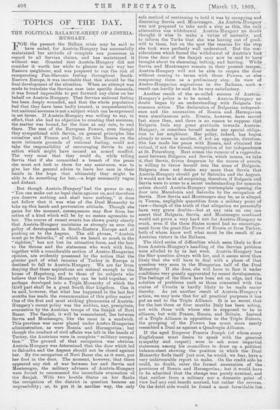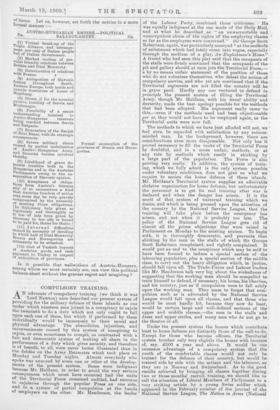TOPICS OF THE DAY.
THE POLITICAL BALANCE-SHEET OF AUSTRIA- HUNGARY.
FOR the present the Balkan crisis may be said to have ended, for Austria-Hungary has successfully Maintained her attitude of complete non poesumug in regard to all Servian claims, and has maintained it without war. Granted that Austria-Hungary did not consider it worth her while to placate in any way her Eastern neighbour, and was prepared to run the risk of exasperating Pan-Slavonic feeling throughout South- Eastern Europe, it was inevitable that this should be the final development of the situation. When an attempt was made to translate the Servian ease into specific demands, it was found impossible to put forward any claim on her behalf on Austria-Hungary. That Servian national feeling has been deeply wounded, and that the whole population feel that they have been badly treated, is unquestionable, but national soreness is not a subject which can be expressed in set terms. If Austria-Hungary was willing to say, in effect, that she had no objection to creating that soreness, the matter was bound, for the time at any rate, to end there. The rest of the European Powers, even though they sympathised with Servia, on general principles like ourselves and France and Italy, or like Russia on the more intimate grounds of national feeling, could not take the responsibility of encouraging Servia to any action which might have caused an armed conflict. The very most that they could do, while telling Servia that if she committed a breach of the peace she: must not look to them for any assistance, was to give her the general advice to leave her case in their hands in the hope that ultimately they might be able to do something for her,—a hope necessarily vague and distant.
: But though Austria-Hungary' had the power to say, "You can make out no legal claim against us, and therefore you deserve nothing and shall have nothing," it does not follow that it was wise of the Dual Monarchy to take uplhis harsh and provocative attitude. Though she gains for the moment, consequences may flow from her action of a kind which will be by no means agreeable to her. The course of recent events has shown pretty clearly that Austria-Hungary maintains as strongly as ever the policy of development in South-Eastern Europe and of pushing on to the Aegean. The old phrase, "Austria must go to Salonika," of which we heard so much in the 'eighties," has not lost its attractive force, and the heir tO the throne and the statesmen who work with him, together with a considerable section of Austro-Hungarian opinion, are evidently possessed by the notion that the greater part of what remains of Turkey in Europe is destined to fall to Austria-Hungary. We are far from denying that these aspirations are natural enough to the house of • Hapsburg, and to those of its subjects who believe that the Dual Monarchy can be held together, or perhaps developed into a Triple Monarchy of which the third part shall be a great South Slav kingdom. Can it be said, however, that what has happened in the last few months has made the consummation of this policy easier ? One of the first and most striking phenomena of Austria- Hungary's recent policy was the sudden, nay, precipitate, evacuation by the Austrian troops of the Sanjak of Novi Bazar, The Sanjak, it will be remembered, lies between Servia and Montenegro, like the meat in a sandwich. This province was never placed under Austro-Hungarian administration, as were Bosnia and Herzegovina ; but though the conduct of civil affairs was left in the hands of Turkey, the Austrians were in complete "military occupa- tion." The ground of that occupation was obvious. Austria-Hungary was determined that the door which led to Salonika and the Aegean should not be closed against her. By the occupation of Novi Bazar she, as it were, put her foot in the door. The moment, however,, that there appeared any risk of war between her and Servia and Montenegro, the military advisers of Austria-Hungary were forced to recommend the immediate evacuation of the Sanjak. With two hostile States on her flanks the occupation of the district in question became an impossibility; or, to put it in another way, the only safe method of continuing to hold it was by occupying and disarming Servia and Montenegro. As Austria-Hungary was not prepared to take such a stop as this, the only alternative was withdrawal. Austria-Hungary no doubt thought it wise to make a virtue of necessity, and to inform the Turks that she was leaving out of good- will to them, but on the spot the reasons for the step she took wore perfectly well understood. But the con- siderations which forced the withdrawal of Austria's foot from the door of the Sanjak may now he said to have • brought about its slamming, bolting, and barring. While Servia and Montenegro remain in their present temper, Austria-Hungary will not be able to reopen the door without coming to terms with those Powers, or else -, conquering them as a preliminary step. In view of Austro-Hungarian aspirations in the Balkans, such a t result can hardly be said to be very satisfactory.
Another result of the so-called success of Austria.- Hungary's policy is to be noted. Austria-Hungary no doubt began by an understanding with Bulgaria for common action. The declaration of Bulgarian independ- ence and the annexation of Bosnia and Herzegovina were simultaneous acts. Events, however, have moved fast since then, and there is no reason to suppose that , Bulgaria feels any great gratitude towards Austria- Hungary, or considers herself under any special obliga- tion to her neighbour. Her policy, indeed, has begun already to move in another, if not an opposite, direction. She has made her peace with Russia, and obtained the virtual, if not the formal, recognition of her independence at St. Petersburg. Next comes the rumour of a rapproche- ment between Bulgaria and Servia, which means, we take it, that Servia, driven desperate by the course of events, is willing to throw herself into the arms of Bulgaria. Bulgaria does not desire any more than Servia that Austria-Hungary should get to Salonika and the Aegean. It would not be at all surprising, therefore, if Bulgaria tied Serail" were to come to a secret understanding for common action should Austria-Hungary contemplate opening' the door into Macedonia and Salonika by the occupation of Servia. Now Servia and Montenegro may be, as is alleged in Vienna, negligible quantities from a military point of view—though Of the truth of that allegation we personally have very grave doubts—but at any rate no one can assert that Bulgaria, Servia, and Montenegro combined , would not prove a very hard nut for Austria-Hungary to crack, even if the three States named had no encourage- ment from the great Slav Power of Russia or from Turkey, both of whom know well what must be the result Of an Austrian victory in the Balkans.
The third series of difficulties which seem likely to flow from Austria-Hungary's handling of the Servian problem were alluded to by us last week. Austria-Hungary has the Slav question always with her, and it seems more than likely that she will have to deal with a phase of that question very soon in the Hungarian half of. the • Dual Monarchy. If she does, she will have to face it under conditions very greatly aggravated by recent developments. The feelings of the Slays have been set on edge, and the solution of problems such as those connected with the status of Croatia is hardly likely to be made easier thereby. As yet another result of Austria-Hungary's action, we may note that for all practical purposes it has put an end to the Triple Alliance. It is no secret that for the last three or four months Italy has been acting, not with those with whom she is supposed to be in alliance, but with France, Russia, and Britain. Instead of a Triple Alliance in opposition to the Triple Entente, the grouping of the Powers has much more nearly resembled a Dual as against a Quadruple Alliance.
If the aged Emperor. •Francis Joseph (of whom every Englishman must desire to speak with the greatest sympathy: and respect) were to ask some impartial statesman among his councillors to draw up a political balance-sheet showing the position in which the Dual Monarchy finds itself just now, be would, we fear, have a • very unfavourable report to make. On the credit side he could, no doubt, enter the formal annexation of the , provinces of Bosnia and Herzegovina; but it would have to be admitted that the change was purely nominal, and that neither from a military nor a domestic point of . view had any real benefit accrued, but rather the reverse. . On the debit side would be found a most formidable list of items. Let us, however, set forth the entries in a more formal manner :— AUSTRO-HUNGARIAN EMPIRE.—POLITICAL DR. BALANCE-SHEET. Ca.
(1) Virtual break-up of the Triple Alliance, and estrange- ment not only of Italian people but of Italian Government.
(2) Marked cooling of pre- vious friendly relations between Britain and Dual Monarchy.
(h) Deterioration of relations
With France. • ('4) Antagonism of Slavonic feeling throughout South- Eastern Europe, both inside and outside dominions of house of Hapsburg.
(6) Direct, if for the moment passive, hostility of Beryls and Montenegro.
(6) Possibility of a secret understanding inimical to A ustro-Hungarian interests being reached between Servia and Bulgaria.
(7) Evacuation of the Sanjo,k of Novi Bazar, with its strategic consequences.
(8) Severe military strain Formal annexation of the caused by partial mobilisation provinces of Bosnia and Herze- of Austro-Hungarian Army, govina. and financial burden involved thereby.
(9) Likelihood of grave do- mestio troubles both in the Rungarian and in the Austrian Parliaments owing to the ex- asperation of Slavonia opinion. (10) Acceptance of obliga- tion from Austria's German ally of so momentous a kind that Austtian freedom of action may some day be very gro,vely compromised by the necessity of meeting those obligations. [In diplomacy help given so vigorously and thoroughly as it has of late been given by Germany to her ally is bound to be paid for, thaler for thaler.] (11) Internal difficulties caused.by necessity of deciding to Which half of Dual Monarchy Bosnia and Herzegovina are ultimately to be attached.
(12) Cost of Turkish boycott of Austrian goods, and cash Payment to Turkey in respect of annexation of provinces.
Is it possible that wellwishers of Austria-Hungary, among whom we most certainly are, can view this political balance-sheet without the gravest regret and misgiving ?







































 Previous page
Previous page